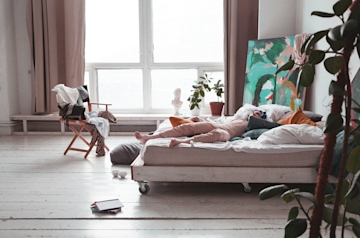
Why the dream of homeownership is unattainable for many
Once a key milestone of adulthood, many young people are shut out of the housing market – or are choosing to avoid it.
6 min read
Wedged firmly between getting married and having children, buying a home was once seen as an essential milestone of adulthood. But, thanks to changing attitudes and a shifting economic landscape, the path to homeownership has become less linear. With skyrocketing housing prices, stagnating wages, rising inflation, and a cost of living crisis, it’s little wonder that young people are up to 30% less likely to own a home than their parents.However, not being able to get a foot on the property ladder may not be as bad as it’s sometimes made out to be. Renting rather than buying a property can be a sensible choice for some folks, and renters are finding alternative ways to build financial security beyond becoming homeowners. Homeownership rates have been steadily declining for the past six decades. Today, 47.9% of young adults own a home, compared to 77.8% in the ‘60s. As a result, adults in their mid-30s to mid-40s today are three times more likely to rent than they were 20 years ago. There are multiple reasons for this disparity. While those born in the ‘60s entered the housing market when prices were cyclically low and wages were relatively high, people born in the ‘80s experienced the exact opposite. Not only did today’s younger generations enter a high-priced housing market, they also grew up in the shadow of the Great Recession. Similarly, those who started university or entered the workforce during the COVID-19 pandemic may also find themselves at a similar disadvantage in the future when trying to get on the property ladder.While 74% of Americans view buying a home as one of the most important milestones of achieving the “American Dream,” nearly 75% of young people cite affordability as the biggest obstacle to becoming a homeowner. Across the pond, 73% of Brits also cite homeownership as a key part of a fulfilling life, but it’s estimated that 33% of young Brits will never achieve this dream. Likewise, 66% of Belgians between the ages of 21 and 35 who don’t own a home say that buying a property in the current climate is impossible, and 10% believe it’ll never become a reality for them. Since the ‘60s, the average price of a home has gradually increased relative to the average median income. This wage-to-housing price disparity has significantly delayed young people’s entry into the housing market or shut them out of it entirely. Thanks to stagnating wages and the long-term impacts of the 2008 financial crisis, young people today have an estimated 35% less wealth than previous generations. Add rising inflation rates to the mix — plus a preference for living in in-demand, more expensive metropolitan areas — and it’s clear that there are many barriers preventing young people from buying a home.An important caveat to add to the homeownership conversation is that the dream of becoming a homeowner is culturally specific. Some of the countries with the highest homeownership rates in the world are Romania (95%), Hungary (92%), Croatia (91%), and Lithuania (89%). That’s because they all belonged to the former Eastern Bloc, where state-owned houses were either sold off cheaply or given to tenants for free after the dissolution of the Soviet Union. While there are significantly more homeowners than renters in Portugal, Spain, Italy, and Belgium, Germany’s renters outnumber its homeowners, with 51% of its citizens renting and 49% owning their homes. This has been largely attributed to Germany’s strong rental protection laws that favor renters. For example, landlords aren’t allowed to raise the rent of their property by more than 10% above the local comparative rent, making renting a more attractive prospect.For many, buying a home creates a sense of security and control over their living circumstances. However, a growing number of people — 34% according to a recent British survey — are actively choosing not to buy a home. The biggest reason that people give for not wanting to become a homeowner is the reluctance to be tied to one place, followed by the steep cost of a down payment. But those aren’t the only reasons why some people find renting more appealing than buying.Just like any financial investment, buying a home means taking on some financial risk. And, just like the stock market, the housing market is also subject to unpredictable fluctuations. During the 2008 financial crisis, house prices fell by 20%, leaving many homeowners paying back mortgages that were much higher than the value of their homes. While such crises also negatively affected rent rates, renters are arguably in a better position than buyers during periods of economic uncertainty.From legal fees and property tax to home inspections, appraisal fees, and various insurance policies, buying a home comes with a lot of additional associated costs. Add in moving expenses and potential renovations — and the costs rise pretty quickly. Renters avoid paying most of these fees.Houses require consistent maintenance to keep them in good condition. While renters can pass all the responsibility for issues such as faulty electrical wiring, mold, or drainage problems on to their landlords, homeowners have to fix these issues themselves – and cover all the costs. Plus, if you want to move to a new country, city, or even just to a new area, it takes much more planning and effort when you already own a home. The flexibility to relocate can allow renters to more easily take advantage of new opportunities, such as a more lucrative job or an interesting creative project.
N26 offers a simplified and stress-free way of managing your money. With Spaces, you can create multiple savings sub-accounts, each tied to one of your savings goals, making it easier to reach your financial targets. Plus, thanks to instant push notifications each time money enters or leaves your account, staying up-to-date with your finances has never been simpler. You’ll also gain a deep understanding of your spending habits with Insights and get a monthly snapshot of your financial health with your Monthly Wrap-Up. Find the right account for you.
Modern homeownership — the status quo
Why buying a home has become a pipe dream for many
The dream of homeownership is culturally specific
The benefits of renting over buying
Less financial risk
Fewer additional costs
Reduced responsibility
Your money at N26
Find similar stories
BY N26Love your bank
Related Post
These might also interest youLIFESTYLECould AI help you manage your money?86% of people are open to using AI for financial planning, but is it safe? Learn how AI is already transforming money management, and discover the pros and cons.
4 min read
LIFESTYLEUnderstanding tariffsFrom higher grocery bills, pricier electronics, and stock market swings, tariffs can impact your wallet and your investments.
5 min read
LIFESTYLEDe-hyping the no-spend challengeThis extreme challenge promises to transform your finances, but is it really the game-changer it claims to be?
4 min read


